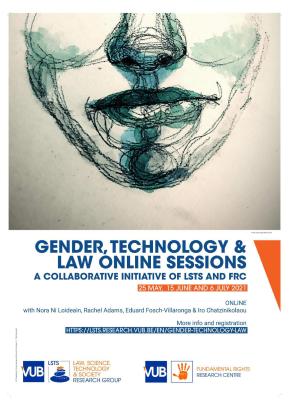The Gender, Technology & Law initiative is happy to announce a new series of online sessions to take place in May, June and July 2021, after its spring and autumn cycles.
The second online session of the current cycle will be animated by Dr. Eduard Fosch-Villaronga, Assistant Professor on Law, Robots, and AI at the eLaw Center for Law and Digital Technologies (Leiden University). LSTS co-director, Prof. Dr. Gloria González Fuster will open the session.
Registration:
The sessions are free to attend but registration is required. To register, please fill in the registration form. Should you face any difficulties with your registration, please send an e-mail to Olga Gkotsopoulou (LSTS) or Carlotta Rigotti (FRC).
Session description: The consequences of missing diversity considerations in the development of algorithms
The implications and deep-rootedness of gender and diversity considerations in practices and structural systems have been largely disregarded in algorithms' development. For instance, automated gender recognition systems clash with the idea that gender is subjective and internal, often leading to misgendering outcomes that may have ulterior adverse effects for parts of the population, including the transgender, intersex, and non-binary community. This talk will explore how current algorithmic-based systems may reinforce gender biases and affect marginalized communities in different applications. To do so, we will bring together notions and reflections from computer science, queer media studies, and legal insights to better understand the magnitude of failing to consider gender and sex differences in the development of algorithms. The talk's goal is to illustrate the potential impact algorithmic bias may have on inadvertent discriminatory and privacy-related concerns for society.
Speaker's bio:
Dr. Fosch-Villaronga is an Assistant Professor at the eLaw Center for Law and Digital Technologies at Leiden University (NL) where he investigates legal and regulatory aspects of robot and AI technologies, with a special focus on healthcare. Eduard recently published the book ‘Robots, Healthcare, and the Law. Regulating Automation in Personal Care’ with Routledge and is interested in human-robot interaction, responsible innovation, and the future of law.Eduard is the co-leader of the Ethical, Legal, and Societal Aspects Working Group at the H2020 Cost Action 16116 on Wearable Robots and the Social Responsibility Working Group at the H2020 Cost Action 19121 GoodBrother. Eduard served the European Commission in the Sub-Group on Artificial Intelligence (AI), connected products and other new challenges in product safety to the Consumer Safety Network (CSN) to revise the General Product Safety directive.Previously, he worked as a Marie Sklodowska-Curie Postdoctoral Researcher under the LEaDing Fellows at eLaw (Jan 2019-Dec 2020). He also was a postdoc at the Microsoft Cloud Computing Research Center at Queen Mary University of London (the UK, 2018) investigating the legal implications of cloud robotics; and at the University of Twente (NL, 2017) as a postdoc, exploring iterative regulatory modes for robot governance. Eduard Fosch-Villaronga holds an Erasmus Mundus Joint Doctorate (EMJD) in Law, Science, and Technology coordinated by the University of Bologna (IT, 2017), an LL.M. from University of Toulouse (FR, 2012), an M.A. from the Autonomous University of Madrid (ES), and an LL.B. from the Autonomous University of Barcelona (CAT, 2011). Eduard is also a qualified lawyer in Spain and his publications are available online.
Gender, Technology & Law Sessions: This session is part of the Gender, Technologies & Law Sessions, a collaborative initiative of the Law, Science, Technology and Society Research Group (LSTS) and the Fundamental Rights Centre (FRC) at the Vrije Universiteit Brussel. The initiative aims at investigating the intersections between gender, technology and law through an interdisciplinary approach. Outcomes of these investigations but also more explorative debates and open questions are presented in a series of seminars, both by internal and external speakers. For more information on the series, see here.



